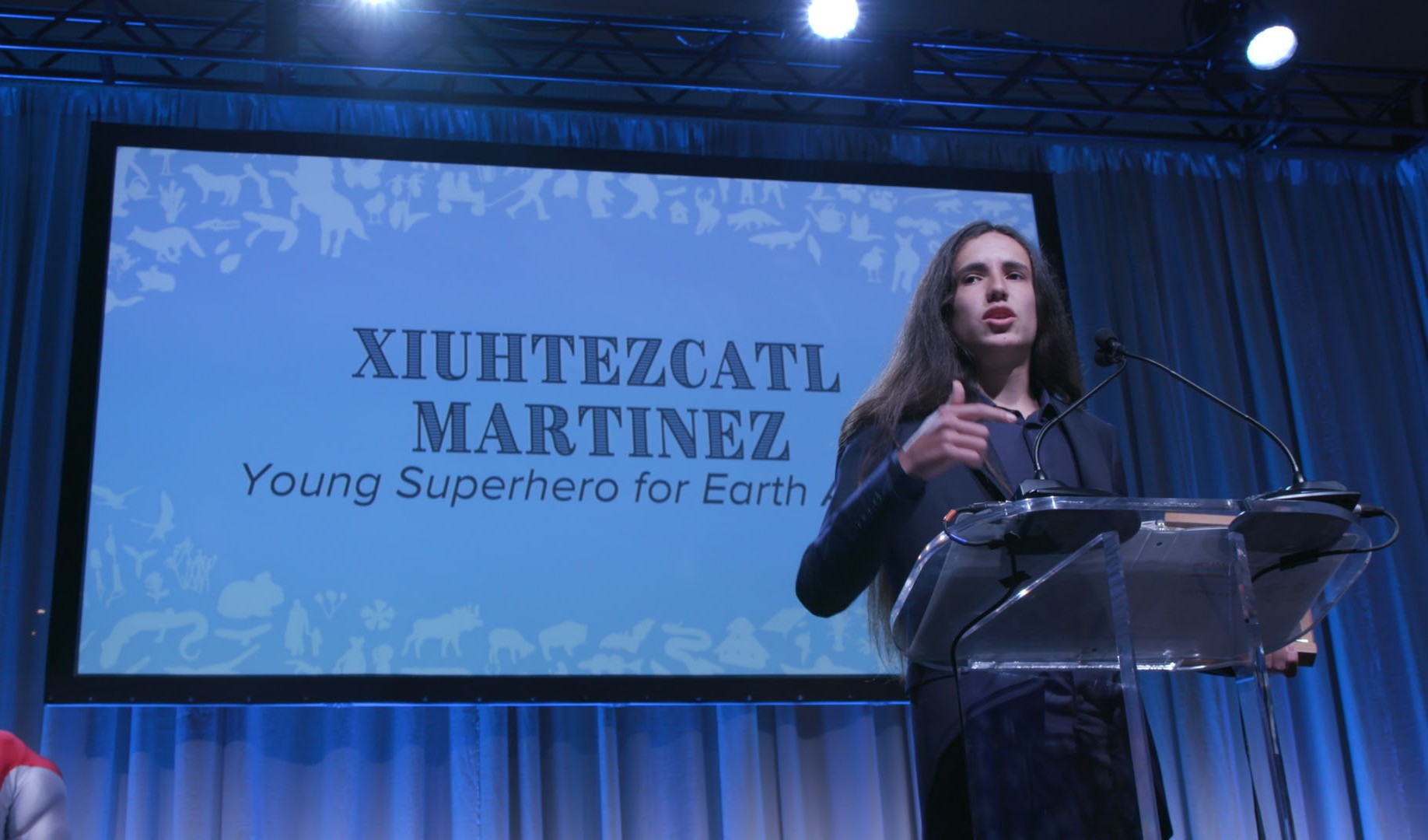Outside of the Trump administration, most people understand that climate change is real and human actions are only making it worse. 2016 was the warmest year on record, and since 1979 the planet, has, on average, been losing sea ice larger than the state of Maryland every year. Rising sea levels and an increase in extreme weather events are just a couple of examples of how climate change affects the world right now. With such an enormous global issue, the task of addressing it seems daunting for any individual person. So the People's Climate Movement (PCM) suggests that everyone come out to their march on April 29 in Washington, D.C. to make a difference with climate change together.
Advertisement
There seems like way too many important issues to march about these days; police brutality, gender inequality, human rights violations, war, LGBTQ rights. Climate change is just another in a laundry list of issues. But National Coordinator for the People's Climate Movement, Paul Getsos, explained why climate change matters most."Our climate cuts across a lot of different issues. It's at the crossroad of immigration, the refugee crisis, economic and racial justice," he said. "Poor people and people of color are impacted by climate change early on because of a wide range of continuing historical and systemic injustices. Environmental issues are social justice issues. We're well underway on the impacts of global warming -- we don't have the luxury of 5-10 years."
He singled out the current administration by name, highlighting President Donald J. Trump's proposed cuts to the Environmental Protection Agency budget by a third and possibly pulling out of domestic and international commitments meant to curb climate change. Getsos explained this massive problem in simple terms: "Trump is trying to roll back the moderate steps we made forward."Trump's budget, if approved, would remove most federal regulations as it relates to corporations' impacts on the environment, and would also leave the maintenance of important natural resources like the Great Lakes to local municipalities.Environmental issues are social justice issues.
Advertisement
PCM organized its first march in 2014 in New York City just before the United Nations Climate Summit. Several organizations came together to put boots on the ground to advocate for meaningful climate action. The first march produced actionable change, and today, more than 50 organizations across the country work together under the PCM banner. While their specific missions range from indigenous rights to local low-income communities to labor, each organization recognizes the importance of addressing the primary issue of climate change.
Check out some more video from VICE:
The BlueGreen Alliance, a collective of labor and environmental organizations founded by the Sierra Club and the United Steel Workers, is one of those enthusiastic PCM partners."This action is in our wheelhouse. For us, climate change is an economic issue at its core," Mike Williams, Vice President of strategic development at the BlueGreen Alliance, told me. "This is a moment of solidarity, and we can use it as a moment to organize. The president's laser focus on dividing the labor movement and the environmental movement is just wrong. This notion that you can't have good jobs if you have a clean environment is absurd."Lydia Avila is the executive director of the PowerShift Network, an organization dedicated to mobilizing the collective power of young people about climate change and clean energy, and explained that our leaders need to be held accountable.
Check out some more video from VICE:

The BlueGreen Alliance, a collective of labor and environmental organizations founded by the Sierra Club and the United Steel Workers, is one of those enthusiastic PCM partners."This action is in our wheelhouse. For us, climate change is an economic issue at its core," Mike Williams, Vice President of strategic development at the BlueGreen Alliance, told me. "This is a moment of solidarity, and we can use it as a moment to organize. The president's laser focus on dividing the labor movement and the environmental movement is just wrong. This notion that you can't have good jobs if you have a clean environment is absurd."Lydia Avila is the executive director of the PowerShift Network, an organization dedicated to mobilizing the collective power of young people about climate change and clean energy, and explained that our leaders need to be held accountable.
Advertisement
"Wield your power and vote. Have a say in your community. Get to know who the decision makers are," she said, and reiterated the power of the PCM. "Show up on April 29 because being responsive and showing discontent and power in the street matters, especially with a president who is so concerned with perception and popularity."Avila also stressed that the fight doesn't end on April 29. "We welcome you to take action afterwards and stay engaged," she said. "It's equally important would be to go home afterwards and make those phone calls."
Staying engaged on the local level is the main concern of some of the PCM partners, such as Empower DC, a nonprofit that focuses on the health and welfare of low and moderate income D.C. residents."If you're not caring about the future, you're just going to fuck up the future," Empower DC environmental justice organizer, Kari Fulton told me. "It feels likes a dystopian novel. We can't afford to only think in terms of short-term corporate benefits or whatever happens in our lifetime. I'll be about 65 in 2050 when scientists predict that we'll have a 9 billion-strong human population we can't feed. We have to make decisions now that impact future generations."Those 2050 scientific projections are pretty grim. If humans stay on the current course of depleting finite energy sources at accelerating rates, and create absurd amounts of carbon emissions without adhering to sustainable practices, the world will see more famine, more displacement, and less access to vital needs like clean water."If you're not caring about the future, you're just going to fuck up the future,
Advertisement
"Who would have thought that we would be at a point in society where the government is denying people their basic rights to exist? But that's the reality when you have people without basic sustenance like food and water," said Williams, "It's something that all of us across movements should stand together to fight.Williams stressed that climate change affects everyone differently, but it should bring everyone together to fight. "Someone facing deportation might not have climate action in their top priorities and that's understandable. It's not that they don't care, they just have an even more immediate concern. That's why it's time to lock arms together and say 'enough.' There are better ways for our country," says Williams.Still, in the face of a climate-change denying administration in the United States, and a global trend of anti-environment right-wing powers that are, some have hope for a brighter future. U.S. Climate Action Network's executive director Keya Chatterjee is one of those people.
"I've seen the resistance work," she said. "People are outraged and they are doing something about it. Our outrage has always been fundamentally about politicians listening to us." She contrasted actionable change brought on by the resistance movement to the Herculean task of the scientific community and the culture at large coming together to put a man on the moon. "It is not as hard to transition from fossil fuels to renewable energy," she said.PCM's own Getsos has his own idea about what success looks like for the march. "It's about having a strong enough mobilization that gets our message across and the participating organizations wanting to continue working together to win."And there's something to look forward to after the march that's actually winnable. "We have to figure out a plan for the 2018 and 2020 elections and beyond," Getsos said. "We definitely want people to come to D.C. on the 29th, but it really is most important for them to follow up at home and be vigilant."Visit the People's Climate Movement website for more details about the march and more information on how to donate or get involved.
